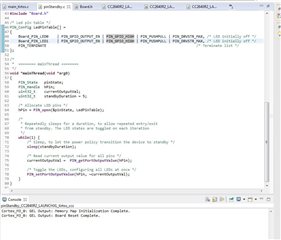Other Parts Discussed in Thread: LAUNCHXL-CC2640R2, CC2640R2L
Hi,
My problem is very similar to the related e2e thread. I have a custom hardware based on CC2640R2L MCU. I program the custom hardware via the debugger on LAUNCHXL-CC2640R2. When I program the custom hardware, for example with the pinStandby example code, it works perfectly well during and after debug, when I programmed the MCU. As soon as I reset the MCU, it stops working completely.
The program stops at the first call to sleep() functions and then never proceeds further. As it is here on line 72.

I am using Simplelink sdk version 4.40 and TI compiler version 20.2.3.
Kindly let me know how to solve this issue. Thanks.


